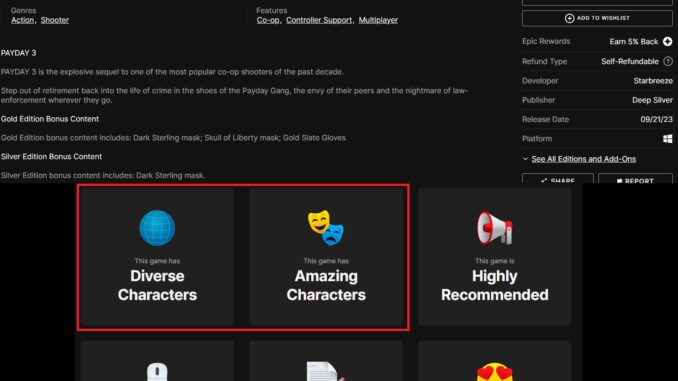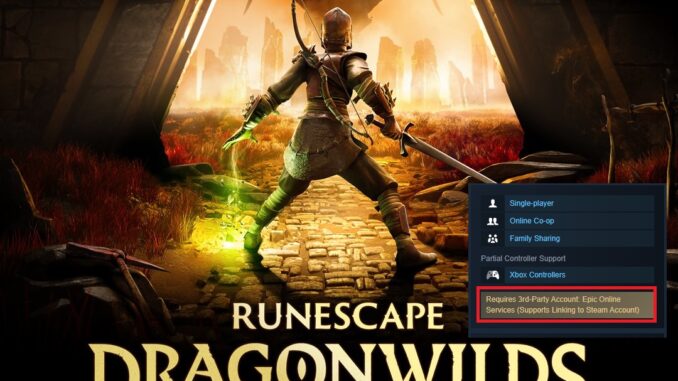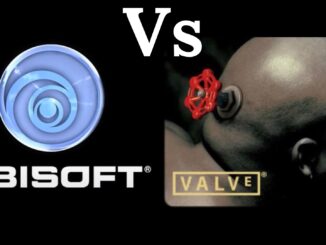
The recent controversy regarding Sony’s PSN requirement for Stellar Blade and Helldivers 2 have reminded PC gamers of the headache that comes with third-party account requirements. However, up until now, there hasn’t been any blowback over this issue when it was implemented by companies such as Microsoft, Electronic Arts, Ubisoft, Activision, Paradox Interactive, Kalypso Media, Starbreeze Studios, and others. While Sony “backed down” in the wake of PC gamers being outraged, it isn’t a success by any real metric. But it does shine a light back on third-party account requirements and why Half-Life developer Valve should remove it from its digital distribution platform Steam.
When it comes to the ever-changing video game market, Valve’s Steam platform has firmly established itself as the premier platform for PC gamers. With its vast library, user-friendly interface, and robust community features, Steam is the go-to destination for millions of players worldwide. Initially, Valve’s reason for Steam’s implementation was to make it more efficient to update and patch games while also being a way to combat both piracy and cheaters. The House of Freeman was the first company to come up with and implement the digital distribution platform after having it rejected by companies such as Microsoft. However, the ease of patching games, buying games, playing online, and other benefits came at a steep price.
Consumer rights and ownership.
Which was at the forefront of the Sony PSN debacle for Stellar Blade and Helldivers 2. The game was being sold in countries where consumers couldn’t create a PSN account and, as a consequence, the games were no longer being sold in those countries. Which meant that those consumers wouldn’t be able to play the full game without a PSN account, if at all. This was a massive consumer rights violation and a blatant example of dishonesty on Sony’s part for selling the game in those regions from the start. These customers had a legitimate reason to be outraged, the rest of PC gamers – not so much.
After all, it was mentioned on the store page that a PSN account would be required. Unfortunately, according to the developer, there were issues in implementing the PSN account requirement and so the feature was delayed. But it was a certainty that it would happen. It was a reminder that the publisher and developer can do what they want, when they want, and that consumers must be more vigilant when making a purchase. As for Valve, while I can respect the company and how they have, for the most part, handled their platform, it still doesn’t negate the fact that we don’t own these games. Steam’s features and tools lessens the sting, but is still a painful reminder of this reality. Sure, Steam users can resell skins, ingame cosmetics, digital cards, and other digital products on Steam but they can not resell the games they purchased. A fact made painfully clear when the French courts initially ruled against Valve stating that consumers should be able to sell their digital copies only to later reverse that decision(we are all for the reselling of video games).
This has been the reality for PC gamers for a long time which has resulted in very little presence regarding brick and mortar stores and almost none in used video games stores. In fact, Steam was the death knell for an already-dwindling PC gaming presence in stores. For those who still buy physical copies, those discs retain no value and might as well be chucked into the garbage after its one-time Steam activation or on whatever is your digital platform of choice.

Make no mistake, Steam offers a lot of benefits when it comes to consumers and gaming. From unified access and cross-platform play to enhanced security and account management games players also gain access to exclusive content, improved multiplayer and social features, customer support, game management, updates, patches, as well as integrated services and ecosystem. It wasn’t just because Valve put Steam out first that it is so successful. It is because Valve continued to make it worth consumers investing their money into the platform.
And so, along with Steam’s success, came the proliferation of third-party account requirements. Unfortunately, for gamers, the majority of third-party accounts do the same thing though not on par with the standard Steam has set or are mediocre services at best or doesn’t fully inform consumers of what they are buying (though Valve could do more such as disclose Chinese involvement with a product). For example, PAYDAY 3 requires a third-party account according to Steam’s store page but there is no mention of that on the Epic Games Store’s page for the game. Which is a huge oversight on Epic since PAYDAY 3 requires a Starbreeze Nebula account to play. What is interesting about EGS and Steam is that EGS is more concerned about advertising that PAYDAY 3 has diverse characters more than letting consumers know you need a third-party account to play the game.
The inherent problems when dealing with third-party accounts involves the inconvenience it provides for players. Having to create another new account and password is annoying while having to login every time you want to play the game. For those who are lazy and stupid, who just use the same username and password across all of your accounts, brings up another issue: security concerns (seriously, at least use different passwords).
Third-party accounts offer hackers another avenue of attack to gain access to your information, accounts, and finances. So if you are someone who doesn’t relish the idea of another person accessing your information, then why do you allow developers and publishers to do so via third-party accounts? Because that is what gamers are providing and it is what developers want access to.
Your information. Because information is power. Your information is more money for them.
When the consumer buys a game and sets up their third-party account, they are giving developers and publishers such as Ubisoft, Activision, and Electronic Arts access to their information. Information that these companies can do whatever they want with, even selling it to other companies such as Facebook.
Let’s not forget that third-party account requirements force gamers to rely on the services those developers and publishers provide. Whenever there is an outage, or an issue on the developer’s part, consumers can’t do anything about it. It is always annoying when Steam has issues that might affect the game, but at least Valve made sure that there was an offline option so games could still be played. Even then, requiring a Steam and third-party account increases the chances of there being an issue where you won’t be able to play the game that you purchased.
Which brings up another problem; forced online connectivity when it comes to some games depending on the developer and publisher. Diablo 3, while not available on Steam, had a singleplayer campaign that required an internet connection to play the game. Ubisoft, especially, loves baking in its always-online requirement for its plethora of titles as well such as Assassin’s Creed Shadows.
Not only are gamers dependent on third-party services, it makes them vulnerable to additional points of failure revolving around, not just downtime, but the discontinuation of the product. One only has to look at Electronic Arts or Ubisoft, who recently deleted The Crew from players’ libraries, to see examples how these companies deal with games they no longer want to support.
Finally, what happens to the games when a developer or publisher goes out of business? How often have we seen, or will we see, large companies do the right thing and remove the third-party requirement and DRM before shutting down its doors?
Be honest.

There is only one thing third-party accounts offer developers and publishers that Steam doesn’t – control. Developers and publishers wanted greater control over their games and players for which third-party account requirements on Steam gives to them. This requirement was a shift in their strategies based upon the realization that their own digital distribution platforms such as Uplay, Origin, Epic Games Store, and XBOX Live couldn’t compete with Steam on the same level.
Some gamers, who shill for developers and publishers, will parrot the argument that third-party accounts allow the companies to create and maintain a direct relationship with the player base. But Steam already provides the tools for companies to do that. The majority of these companies don’t want a relationship with you. They want to extract money from you.
That’s why we see ever-increasing price gouging for games. Especially games that aren’t fully developed or reach a threshold of quality that was once the standard before the internet became prevalent. It’s why we see absurdly asinine DLC being created. It’s why games are being partitioned unless you have a third-party account.
Companies want to control and own you but don’t want you to own their products.
‘

Third-party accounts are redundant, unnecessary, anti-consumer, anti-consumer rights, anti-privacy, uses up PC resources and is an inconvenience. Consumers shouldn’t be punished by companies that are incapable of competing with Valve’s digital platform. Gamers shouldn’t be forced to sign up for an account belonging to a company they might not trust if they took the time to look at what they are signing up for. But, if Valve were to take this step, it could force these developers and publishers to finally create a competent, competitive platform in order to entice gamers to sign up for their services. It would also give more power to consumers who would have the choice as to whether or not they trust companies such as Ubisoft and Electronic Arts with their information and privacy.
Valve has always been a company that listens to its community. But the community needs to convince Valve to take a stand against the proliferation and continued encroachment of third-party accounts on Steam. By removing these requirements, Valve would once again show its commitment to delivering the best possible gaming experience. This move would not only simplify life for players but also strengthen the platform’s position as the ultimate destination for PC gaming.
Suffice to say, the removal of third-party account requirements from Steam would be a win-win situation for gamers. Players would enjoy a more streamlined, secure, and enjoyable gaming experience, while Valve would reinforce its reputation as a player-first company. Let’s keep Steam the unified, user-friendly platform it was always meant to be.
Valve, it’s time to act.
Author’s Note: Support this site by donating via Paypal or even checking out our merchandise on RedBubble where you can find designs that cater to writers and readers. Money donated and raised goes into paying for this website and equipment.






[…] must use in order to play the game they purchased; even having to create and possibly install a third-party account which is a problem in and of itself. One exception being GOG.com where you can buy your digital copy and play it […]
[…] There are probably better ways to go about dealing with this situation. But if packaged food is required to show all the ingredients used to make it, percentages of nutritional value must be shown, or fresh produce’s country of origins clearly marked, then why not something similar for the video game industry? The infrastructure is there for censoring gamers, the backdoor is in place for exploitation of your data, and your information is probably being collected and stored already (many of these things have been happening in Western gamers and is “Why Valve Needs To Remove Third-Party Accounts From Its Steam Platform). […]
[…] end that prevented a user’s third-party login information to be verified (we recommend Valve ban third-party account requirements from […]
[…] tends to be some simple things to quickly weed out in any specific game – DRM, always-online, third-party app requirement, EULA terms and conditions, graphics, country of origin such as China or Russia being the […]